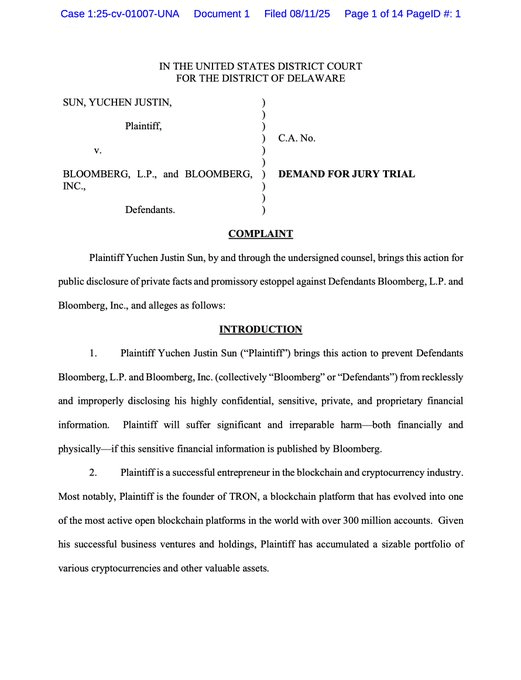Justin Sun, the founder of the TRON blockchain, has sued Bloomberg in federal court in Delaware, accusing the news agency of breaching confidentiality promises and preparing to disclose his actual cryptocurrency portfolio.
The 14-page complaint, filed on August 1, states that the dispute began when Bloomberg sought to include Sun in the Bloomberg Billionaires Index, a ranking of the 500 richest people in the world.

According to the complaint, Sun only agreed to provide details about his assets after Bloomberg repeatedly committed, both in writing and verbally, that the information would be kept confidential and only used to verify his net worth.
Sun noted that internal messages from Bloomberg showed that reporters and editors agreed to restrict access to the figures and delete them after verification. He also reviewed other records in the index and found no precedent for publishing an analysis of each cryptocurrency unless those figures had been made public.
The lawsuit alleges that the Bloomberg draft report, sent to him at the end of July, includes "many inaccuracies" along with a detailed list of his cryptocurrency assets by token. Sun stated that disclosing this information would violate the agreement between the two parties and put him at risk, potentially facing hacking, theft, extortion, or even endangering his and his family's lives.
On August 2, his lawyer sent a letter requesting Bloomberg to restrict all reports on his total net worth and broad asset categories. Bloomberg's news legal counsel responded that the company intends to publish a detailed analysis "soon."
Sun is seeking a temporary restraining order, along with a preliminary and permanent injunction, to prevent publication. He is also requesting the court to compensate for legal costs, accusing Bloomberg of disclosing personal information and hindering the fulfillment of promises.
The case has attracted public attention after software engineer and cryptocurrency commentator Molly White shared court records. In a post on X, White quoted Sun as saying that Bloomberg planned to "recklessly and improperly disclose his sensitive, private, and proprietary financial information," which was only provided to verify his position on the index.
This dispute has sparked a broader debate in the cryptocurrency community about how far financial publications can go in reporting on the wealth of digital asset holders and how the line between public interest and personal security should be drawn.
